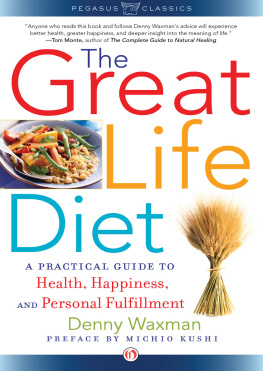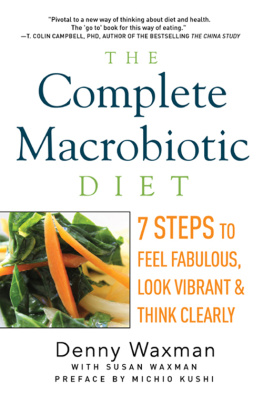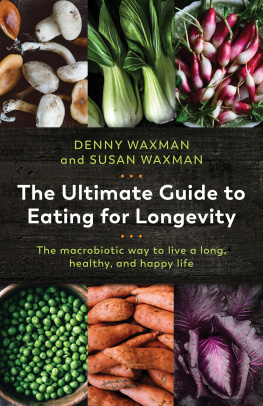The
Great
Life
Diet

A PRACTICAL GUIDE TO
Health, Happiness,
AND Personal Fulfillment

Denny Waxman
PREFACE BY MICHIO KUSHI

PEGASUS BOOKS
NEW YORK
T HE G REAT L IFE D IET

P REFACE
BY M ICHIO K USHI
Humanity faces unparalleled opportunities and challenges as the new century unfolds. The world is unified more than ever through the Internet, cell phones, and other new technologies. At the same time, the threat of terrorism and nuclear blackmail, the outbreak of new viral diseases and epidemics, and the spread of cancer, heart disease, and other chronic ills are at an all-time high. Our children and grandchildren may inherit a globally warmed planet that is difficult to inhabit.
For the last half-century, macrobiotics has been in the forefront of the movement to promote personal and planetary health and peace. Derived from the traditional Greek words for great life, macrobiotics encourages people to take responsibility for their own health and happiness by harmonizing with nature and the cosmos. The most effective way to do this is to eat a balanced natural foods diet, centered on whole grains, vegetables, beans, sea vegetables and fruits in harmony with the seasons, the climate, and other environmental factors.
The value of this approach is now almost universally accepted. In its food guidelines for the American people, the U.S. government officially promotes whole grains as the foundation of a healthy diet. The newest version of the Food Guide Pyramid, released in 2005, calls for brown rice, millet, whole wheat, and other grains to be the center of every meal.
The benefits of a macrobiotic diet are becoming increasingly recognized. At Harvard Medical School, cardiovascular researchers report that people eating a macrobiotic diet for an average of two years have virtually no risk of coronary heart disease, the major cause of death in modern society. Scientists at Tulane University in New Orleans, Louisiana, and the National Tumor Institute in Milan, Italy, report that a macrobiotic diet may help prevent or control cancer. Researchers at the New England Medical Center in Boston report that macrobiotic women process estrogen better than others and this may explain their low incidence of breast cancer. The National Cancer Institute wishes to start clinical trials on the macrobiotic approach to cancer after reviewing several of 76 medically-documented recoveries compiled by researchers for the National Institutes of Health.
Other medical studies have shown that a macrobiotic way of eating is beneficial for improving childhood nutrition, reducing violent and aggressive behavior among young juvenile offenders, controlling T-cells in young adults with AIDS, improving geriatric and psychiatric health, and reducing multiple chemical sensitivities.
According to environmentalists, a macrobiotic-oriented diet will benefit the earth as well as the people it sustains. Organically growing grains and vegetables as our staple crops instead of animal foods reduces our dependence on fossil fuels, chemicals, and other toxins, enriches the fertility of the soil, and results in cleaner air and water.
Over the years, Denny Waxman has been one of my closest students and associates and has served in the forefront of this health revolution. He founded Essene, the pioneer natural foods store in Philadelphia, in the late 1960s and organized seminars on diet and health in the 1970s. In the early 1980s, he helped Anthony J. Satillaro, M.D., the president of Methodist Hospital in Philadelphia, recover from terminal cancer. The story was featured in the Saturday Evening Post, Life Magazine, and later in a best selling book Recalled by Life and has helped to popularize macrobiotics around the world. At the Strengthening Health Institute that he founded in the 1990s, Denny has developed a simple, practical approach to macrobiotic education that focuses on seven steps to better health.
In The Great Life Diet, Denny distills the essence of macrobiotic principles and teachings. He presents his seven steps in a clear, concise way that can be readily understood and practiced. Seasoned with insights and humor from his personal experience, counseling practice, and global travels, the book offers a compass to maintaining health, happiness, and freedom. A wealth of practical information, including lists of recommended foods, basic recipes, and meal suggestions, helps the reader get started.
Thanks to Denny and a remarkable generation of macrobiotic teachers, counselors, and natural foods cooks, the seeds of a healthy, peaceful world community have been planted. The Great Life Diet is a passport to a healthier, more harmonious life.
M ICHIO K USHI
Brookline, Massachusetts
Michio Kushi is the leader of the international macrobiotic community. The Smithsonian Institution recognized his pioneering contribution to the modern organic, natural foods movement; complementary and alternative medicine; and peace education by establishing a permanent Kushi Family Collection on Macrobiotics at the National Museum of American History in Washington, D.C.
ACKNOWLEDGEMENTS
This book represents a major portion of my life. I would like to thank and acknowledge all the people who have helped me and are, therefore, a part of it.
Without my parents, Anna and Herman Waxman, I would not be able to offer this book. It is with the deepest respect and appreciation that I acknowledge them.
To Michio and Aveline Kushi, my spiritual parents, who have spent their lives teaching macrobiotics and spreading it throughout the world. They have given me endless inspiration, encouragement and personal guidance.
To my teachers, George and Lima Ohsawa, Herman and Cornelia Aihara, Shizuko Yamamoto, and William Dufty, who have dedicated their lives to macrobiotics and given us this powerful legacy.
To Takashi Yoshikawa, who has helped me so greatly to broaden and deepen my understanding of ki, which I have used to strengthen the health and lives of all those I have been privileged to help.
To my brother, Howard, who has shared the dream of macrobiotics and Essene with me.
To my children, Nathan, Joe, Naomi, Alisa, Madeline, Amy, Zoe, Andrew, Natasha, and Sam, who brighten my life.
To my friends and associates, Bill Tara, Murray Snyder, Bill Spear, Judith Flohr, Melanie Waxman, Michel Matsuda, Patrick Riley, Michel Abehsera, Michael Kessler, Gary Flaxenburg, and Gabor Szalontay, Rod and Peggy House, and Simon and Dragana Brown, with whom I have shared many macrobiotic adventures.
To my dear friends, Doug FitzSimons, Don and Mary Marti, Mona Schwartz and Helen Stevenson, who have played a very significant role in my life.
To Ruth Ann and Jeffrey Dubb, who opened their home to me and helped me on my return from Portugal.
To my dear friends and close associates at the SHI, Leslie Frodema, Warren Kramer, Michelle Nemer, Joe Waxman, Lear Blitzstein and Jeremy and Susan Higa, without whom my dream of building a school could not have been realized.












